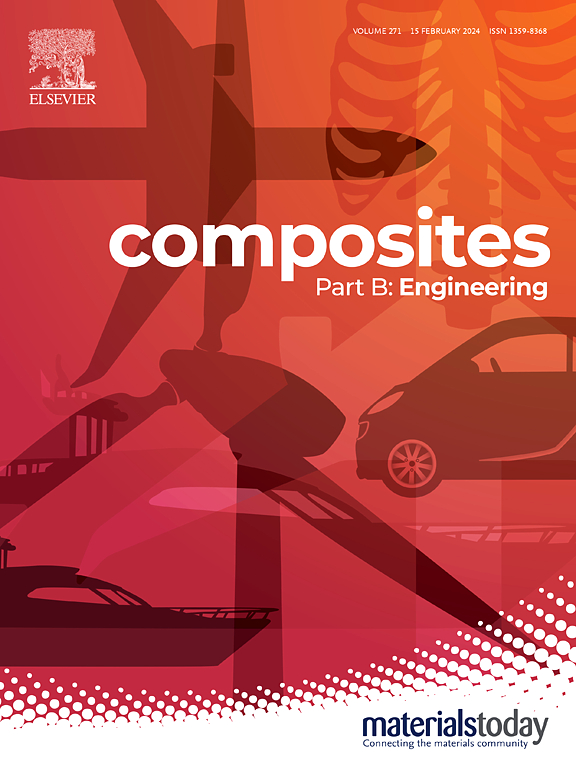Comprehensive evaluation of tensile properties, damage mechanisms, and predictive modeling of pultruded GFRP after elevated temperatures
IF 14.2
1区 材料科学
Q1 ENGINEERING, MULTIDISCIPLINARY
引用次数: 0
Abstract
The performance of pultruded GFRP composite exposed to elevated temperatures is investigated. All composite samples were heated to 80 °C, 200 °C, 300 °C, 325 °C, 350 °C, and 400 °C with duration of 15, 30 and 45 min. The samples were then subjected to tensile strengths and mechanical properties were determined. DMA, DSC and TGA analyses as well as burn off tests were carried out. The experimental findings revealed that the 80 °C treatment enhanced mechanical properties in terms of tensile stresses Young's modulus due to post-curing effects. On the other hand, temperatures higher than 200 °C reduced mechanical properties. At 300 °C, tensile stress decreased by 8.7 %, while the Young's modulus was reduced by 10.9 %. As shown, the maximum degradation occurred at the highest temperature of 400 °C, where tensile stress had reduced by 41.3 % and Young's modulus had been reduced by 47.7 % after 45 min. Moreover, detailed damage analyses were performed and structural damage in the form of delamination and cracking was evident at higher temperatures. More importantly is that a mathematical model based on the hyperbolic tangent function was developed and this model accurately predicted the mechanical behavior of GFRP composites exposed to elevated temperature.
拉伸性能的综合评价,损伤机制,和预测模型后的高温拉伸玻璃钢
研究了拉伸GFRP复合材料在高温下的性能。将复合材料分别加热至80°C、200°C、300°C、325°C、350°C和400°C,加热时间分别为15、30和45 min。然后对复合材料进行拉伸强度和力学性能测试。进行了DMA、DSC和TGA分析以及燃尽试验。实验结果表明,由于后固化效应,80°C处理提高了拉伸应力杨氏模量方面的力学性能。另一方面,温度高于200°C会降低机械性能。在300℃时,拉伸应力降低了8.7%,杨氏模量降低了10.9%。如图所示,最高温度为400°C时,45分钟后拉伸应力降低了41.3%,杨氏模量降低了47.7%。此外,进行了详细的损伤分析,发现在较高温度下,分层和开裂形式的结构损伤很明显。更重要的是建立了基于双曲正切函数的数学模型,该模型准确地预测了GFRP复合材料在高温下的力学行为。
本文章由计算机程序翻译,如有差异,请以英文原文为准。
求助全文
约1分钟内获得全文
求助全文
来源期刊

Composites Part B: Engineering
工程技术-材料科学:复合
CiteScore
24.40
自引率
11.50%
发文量
784
审稿时长
21 days
期刊介绍:
Composites Part B: Engineering is a journal that publishes impactful research of high quality on composite materials. This research is supported by fundamental mechanics and materials science and engineering approaches. The targeted research can cover a wide range of length scales, ranging from nano to micro and meso, and even to the full product and structure level. The journal specifically focuses on engineering applications that involve high performance composites. These applications can range from low volume and high cost to high volume and low cost composite development.
The main goal of the journal is to provide a platform for the prompt publication of original and high quality research. The emphasis is on design, development, modeling, validation, and manufacturing of engineering details and concepts. The journal welcomes both basic research papers and proposals for review articles. Authors are encouraged to address challenges across various application areas. These areas include, but are not limited to, aerospace, automotive, and other surface transportation. The journal also covers energy-related applications, with a focus on renewable energy. Other application areas include infrastructure, off-shore and maritime projects, health care technology, and recreational products.
 求助内容:
求助内容: 应助结果提醒方式:
应助结果提醒方式:


